Marjorana, Oreganum; Marjoram and OreganoMarjoram: Sweet Marjoram, Marjoram gentleOregano: Wild or Winter Marjoram |

|
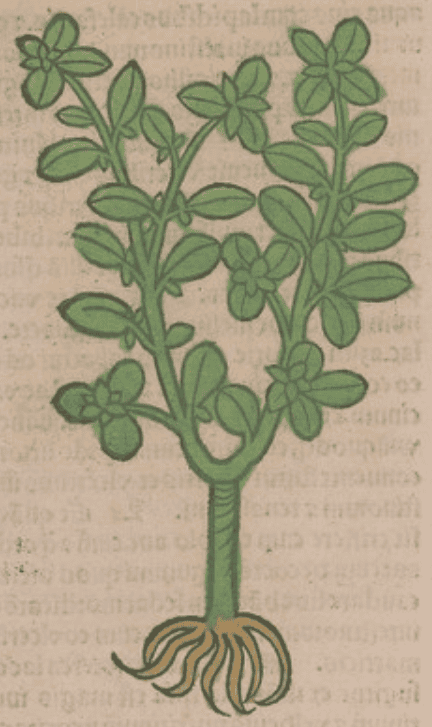
|
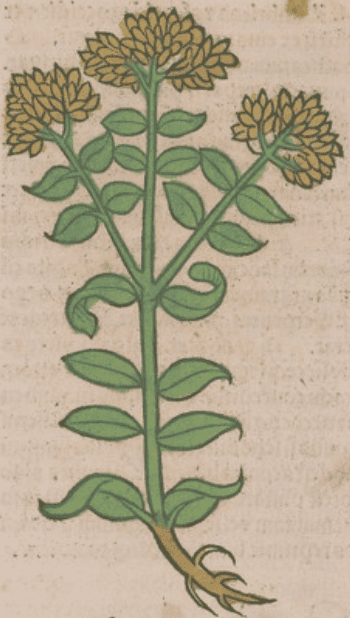
|
Ortus Sanitatis, Meydenbach, 1491
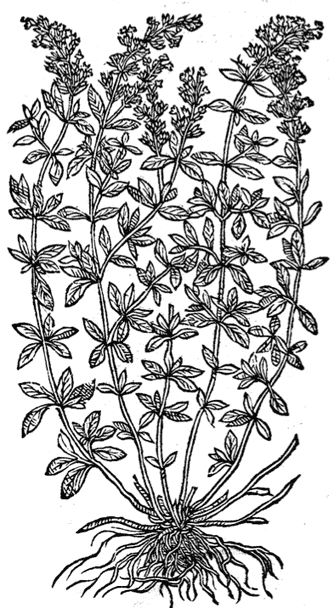
|
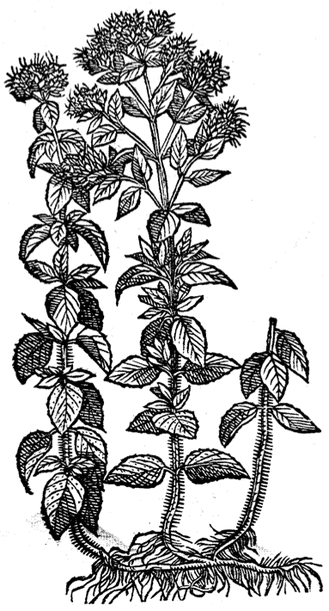
|
Dioscorides Materia Medica, Mathias, 1563
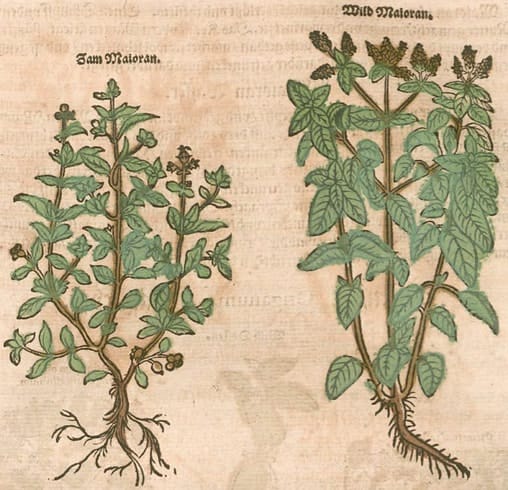 Oregano and Marjoram
Oregano and MarjoramKrauterbuch, Lonitzer, 1578
|
|
|
Icones Plantarum Medcio-oeconomico, Vietz, 1804
Botanical name:
Oreganum spp.
O. marjorana (Marjoram), O. vulgare (Oregano)
A number of related species are used.
Parts used:
Leaf; Seed
Temperature & Taste:
Warm, dry
Classifications:
MARJORAM:
2B ATTENUATERS. 2D ATTENUATERS OF CONGEALED BLOOD. 2H. CARMINATIVE. 2Q. ANODYNE
3G. EMMENAGOGUE. 3M. ARTHRITICS. 3P. MASTICATORIES & STERNUTATORIES.
4a. CEPHALIC. 4b. OPTHALMIC. 4e. STOMACHIC. 4g. HEPATIC. 4j. NERVINE
OREGANO:
2B ATTENUATERS. 2F. PURIFYING. 2G. CLEANSING. 2H. CARMINATIVE. 2K. RESOLVENT
3C. ALEXIPHARMIC. 3F. LITHONTRIPTIC. 3G. EMMENAGOGUE. 3K. EXPECTORANT. 3P. MASTICATORIES & STERNUTATORIES.
4a. CEPHALIC. 4d. PECTORAL. 4e. STOMACHIC. 4f. SPLENETIC. 4g. HEPATIC. 4i. UTERINE. 4k. ARTHRITIC
Uses:
1. Settles Wind, Moves the Blood, Eases Pain:
-’used chiefly in Head-diseases, and diseases of the Nerves … strengthens the Brain, discusses Wind’. (Marjoram, Schroder)
-Headache, Apoplexy, loss of Speech, Tinnitus, Dizziness, Vertigo
-‘excellent against all types of induration and stiffness’. (Galen)
2. Clears Wind-Cold, Resists Poison:
–Colds, Flu, and in Fevers
–chronic Cough, Breathlessness, Difficulty Breathing, Wheezing, and Asthma (Oregano)
–beginning stages of Measles, and other eruptive skin diseases
–bites of Venomous Beasts, and as an antidote to Hemlock, Henbane and Opium (Oregano)
-The fresh or dried leaves are ‘drunk in wine for all Mortal Poisons’ (Oregano, Gerard)
3. Moves Blood, Clears Stasis, Promotes Menstruation:
-good for the Uterus; promotes Menstruation: Amenorrhea, Dysmenorrhea (Oregano)
-Infertility
-promotes Birth
–‘dissolve congealed or clotted blood’ (Marjoram, Gerard)
4. Clears Damp, Promotes Urine:
-Edema; difficulty urinating; scanty or painful urination
-Gravel, Stones, Lower Back Pain
-decoction is best for this purpose
5. Moves Qi, Benefits the Stomach:
–‘scarcely a better herb growing for relieving a sour Stomach, Loss of Appetite’.
–Indigestion, Dyspepsia, Colic, Flatulence, Nausea and to prevent Vomiting
6. Moves the Blood, Opens the Liver:
–‘draw forth by stool black and filthy humours’. (Pliny)
–‘bad color which comes of the Jaundice’. (Oregano, Gerard)
7. Externally:
-as an Errhine to purge Phlegm from the Head.
-in pessaries and douches to promote menstruation and clear blood stasis of the Uterus
-topically for Fibroid Tumors of the Breast
–topically for all Pain and Inflammations
–salve was applied to ‘members that are out of Joint … the Oil … warms and fastens the Sinews’ (Turner 1551)
–‘putteth away black and blue marks after stripes and bruises, being applied thereto’ (Gerard)
-applied to Sores and Ulcers
-as a plaster with Barley for Eye inflammations
Comment:
Marjoram and Oregano are used similarly. Oregano is generally regarded as stronger, better to promote Menstruation, and better to promote sweat. Marjoram was more commonly used.
Dose:
Decoction: 3–9 grams (dried): 10–30 grams fresh.
Powder: 2–4 grams
Substitutes:
1. Marjoram and Oregano can substitute for one another
2. Mint, Peppermint, Wild Mint
Main Combinations:
1. Colds, Oregano with Linden leaf (Klöpfer)
2. Catarrh:
i. Oregano, Fig, Rue (Walser)
ii. Marjoram, Calamus, Elder flower (as in Wine for Catarrh)
iii. Marjoram and Oregano with Balm, Betony, Nutmeg, Clove, Benzoin, Frankincense, Mastic (as in Powder for Catarrh)
3. Promote Menstruation, Oregano with Mugwort, Camomile, Mint
4. Nausea and Dizziness during Menstruation, Marjoram with St. Johns wort, Ladies Mantle, Angelica
5. To promote Urine, Marjoram with Pyrethrum and Long Pepper
6. Stomach disorders Marjoram with Yarrow, Angelica and Centuary
7. Stomach pain, Marjoram with Camomile, Rue, Pennyroyal, Rosemary, Cumin, Aniseed, Fennel seed (as in Decoction for Stomach Pain)
8. Headache and Migraine:
i. Marjoram with Camomile, Valerian, Fennel and Celandine
ii. Oregano, Marjoram, Thyme, Rosemary, Peppermint, Lavender
9. Vertigo, Marjoram with Cumin, Coriander, Calamus, Aniseed (as in Sugar for Vertigo)
10. Tinnitus, Marjoram with Rue, Stoechas, Wild Mint, Camomile (as in Tincture for Tinnitus)
11. Loss of Memory:
i. Marjoram with Calamus, Thyme, Stoechas, Clove, Orris (as in Powder to Strengthen the Memory)
ii. Marjoram with Rosemary, Sage, Betony, Balm, Peony, Cinnamon, Nutmeg, Licorice, Frankincense (as in Powder of Great Use Against Forgetfulness)
12. Bruising, Marjoram powder mixed with honey and applied.
13. Cold Pains of the Head, Nerves, or Sinews, Marjoram with Thyme, Myrtle leaf and berry, Southernwood and Mint (as in Compound Marjoram Oil)
Major Formulas:
Cephalic Decoction (Charras)
Decoction for Cough and Asthma (Dioscorides)
Decoction for Stomach Pain
Decoction for Difficult Childbirth (Barbette)
Syrup of Betony (Pharmacopoeia Augustana)
Tincture Against Schirrus of the Spleen
Powder for Catarrh (Grulingus)
Powder to Strengthen the Memory (2)
Powder of Great Use Against Forgetfulness (Grulingus)
Cautions:
Not used during Pregnancy
Main Preparations used:
Marjoram: Distilled Water of the fresh Leaves, Conserve of the Tops, Confection of the Seed, Distilled Oil of the Leaves, Balsam of the Distilled Oi
Oregano: Distilled Water, Distilled Oil, Salt of the Ashes
1. Distilled Water:
i. Marjoram or Oregano (1 part), Water (4 parts). Distil one-half and re-distil with fresh herb.
2. Infused Oil of Marjoram:
i. Fresh Marjoram, Olive oil (of each one pound). Macerate several days, then boil on a low fire to consume the humidity, express. A second infusion with fresh herb can be made to make it stronger.
